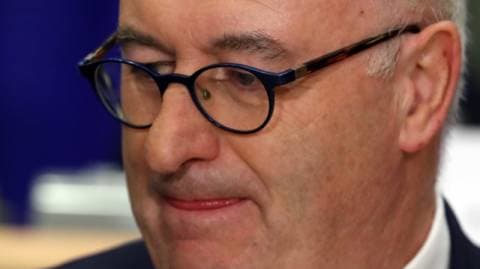
By Andrea Shalal
WASHINGTON (Reuters) - European Union trade commissioner Phil Hogan said his meetings with senior U.S. officials marked a "good start" to resetting trade ties with Washington, but there was more work to do.
Hogan said on Thursday that he had a good exchange of views with U.S. Trade Representative (USTR) Robert Lighthizer twice during his visit, underscoring Brussels' desire to negotiate solutions for several open disputes between the allies and avoid costly and economically damaging tit-for-tat tariffs.
"It's a good start ... but we've a lot more to do," Hogan told reporters after over three days of meetings with U.S. officials, lawmakers and business executives, with further trips planned in February and March.
He said Brussels hoped to leverage concerns it shares with Washington, about China and the need to reform the World Trade Organization, to move forward on settling disputes about aircraft subsidies, digital service taxes and trade barriers.
"I didn't expect to be successful in resetting the relationship in two days," Hogan said.
The USTR had no immediate comment on the meetings with Hogan beyond a statement on Tuesday together with the EU and Japan that unveiled a joint proposal to call for global rules on use of market-distorting government subsidies by China and other countries.
Former EU agriculture commissioner Hogan said he had worked with Lighthizer in the past to successfully resolve a dispute over hormone-free beef.
"Sometimes we like the messages and sometimes we don’t, but at least we know where we stand, and that’s nice to have as well," Hogan said of his dealings with Lighthizer.
The EU was open to considering a mini-trade deal similar to those negotiated by Washington with Japan and other countries, Hogan said. One prospect might be to focus on sanitary and phytosanitary standards, he said.
Brussels was not ready to put agriculture on the table in broader trade talks, Hogan said, but the EU had already increased purchases of U.S. soybeans, cereal and liquified natural gas as a goodwill gesture.
He said there was also greater U.S. engagement with an EU proposal to resolve a dispute over government subsidies to Boeing Co and Airbus. U.S. officials viewed the proposal as insufficient, but it offered a basis for discussions, Hogan said.
China and its aircraft industry will be the biggest winners if the United States and the EU do not resolve their differences and work together, Hogan said at a Center for Strategic and International Studies event.
He said tit-for-tat tariffs would harm both sides, but the EU would respond if Washington slapped tariffs on EU products in the aircraft subsidy case.
(Reporting by Andrea Shalal; Editing by Chizu Nomiyama and Grant McCool)